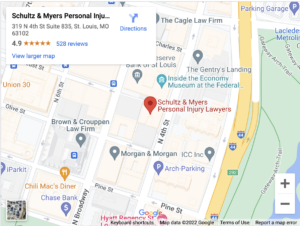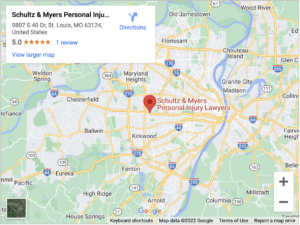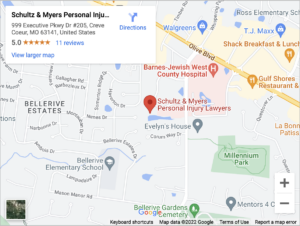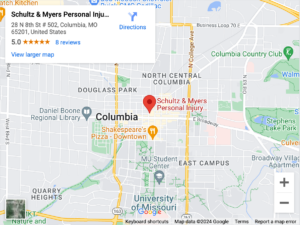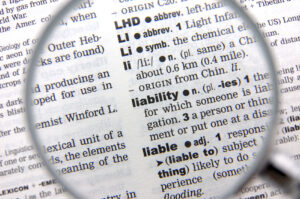
Liability is the legal responsibility for something. In personal injury cases, liability is when a party is held financially responsible for the harm their actions caused another person. If you are injured by another party’s intentional acts or negligence, you might be entitled to compensation for damages if you can prove liability.
How Do I Prove Liability in a Missouri Personal Injury Case?
Most of the personal injury claims in Missouri are based on general negligence. However, there are situations in which other types of liability could apply, including strict liability and vicarious liability.
Personal Injury Cases Based on General Negligence

Negligence is the failure to act with reasonable care. Reasonable care is based on what an ordinarily prudent person would have done in the same or similar situation. In other words, what were reasonable steps a party could have taken to avoid causing harm or injury?
Proving liability in a negligence claim requires you to produce evidence that proves:
- Duty of care – The party you accuse of injuring you owed you a legal duty of care.
- Breach of duty – The accused party breached the duty of care through their acts or omissions.
- Causation – The breach of duty was a direct and proximate cause of your injury.
- Damages – You sustained harm, losses, and damages because of the party’s breach of duty.
General negligence generally applies in personal injury cases involving motor vehicle accidents, medical malpractice, slip and fall accidents, and premises liability claims. In addition, you must prove your case by a preponderance of the evidence. In other words, it is more likely than not that the party caused your injury.
Personal Injury Claims Based on Strict Liability
Strict liability imposes responsibility for damages regardless of the party’s intent.
Three types of personal injury cases might involve strict liability:
- Abnormally dangerous activities, even though the party took reasonable care to avoid causing harm
- Product liability claims for injuries caused by defective products, including design and manufacturing defects
- Dog bite cases – Missouri law holds dog owners strictly liable for damages, even if the dog has never bitten anyone or acted viciously in the past
Even though a party can be held strictly liable for damages, you must still prove that you were injured because of the party’s conduct or something the party controlled. You must also prove you sustained damages to recover compensation.
Personal Injury Claims Based on Vicarious Liability
Generally, only the party directly responsible for an injury is held liable for damages. However, vicarious liability holds another party liable if they had a supervisory role over the party who caused the injury.
Vicarious liability can be used if an employee causes an injury. For example, a worker causes an accident while driving for their employment, such as a commercial truck accident. Another example could be a retailer being liable for an employee causing a customer to fall and break their leg.
What Damages Can I Receive If a Party Is Liable for Causing My Injury?
The court cannot undo the physical harm caused by another party. However, it can hold the party responsible for damages, including your pain and suffering.
Damages in a personal injury claim include:
- Reimbursement for economic damages, including lost wages, medical expenses, and out-of-pocket expenses
- Compensation for future financial losses, including a decrease in earning capacity and ongoing care
- Compensation for non-economic damages, including emotional distress, physical pain, and mental anguish
Damages also include the harm caused by permanent disability and impairment, such as a decrease in quality of life and a loss of enjoyment of life.
In some cases, the court might award punitive damages. However, these damages do not compensate the injured party for losses or harm, even though the victim receives the money.
Instead, punitive damages “punish” an at-fault party. Only a few cases qualify for punitive damages.
What Is the Statute of Limitations for Personal Injury Claims in Missouri?
Most personal injury claims are subject to a five-year deadline for filing lawsuits. If you do not file your lawsuit before the deadline, you’ll lose the right to pursue legal action. Wrongful death claims have a three-year statute of limitations.
However, exceptions to the rule could change the deadline for filing claims. Therefore, it is always wise to talk with a St. Louis personal injury lawyer as soon as possible after an injury.
Contact a St. Louis Personal Injury Lawyer for Help Proving Liability
Navigating the claims process and proving liability when going up against a large insurance company can be challenging. You are not alone. You can have an entire legal team working on your behalf.
Our law firm accepts cases on a contingency fee basis. Therefore, hiring a St. Louis personal injury attorney does not cost you any money upfront. Call now for a free consultation to discuss your case with an injury lawyer.
Schultz & Myers Personal Injury Lawyers – St. Louis Office
319 N. 4th Street, Suite 835
St. Louis, MO 63102
(314) 444-4444

